Key takeaways:
- Videographers not only capture events but also tell emotional stories, making their role pivotal in preserving wedding memories.
- Key qualities to look for in a videographer include emotional connection, a strong and diverse portfolio, and effective communication skills.
- Evaluating portfolios involves assessing emotional resonance, editing styles, and versatility across different wedding settings.
- Open discussions about budget and package options are essential to ensure clarity and avoid unexpected costs.
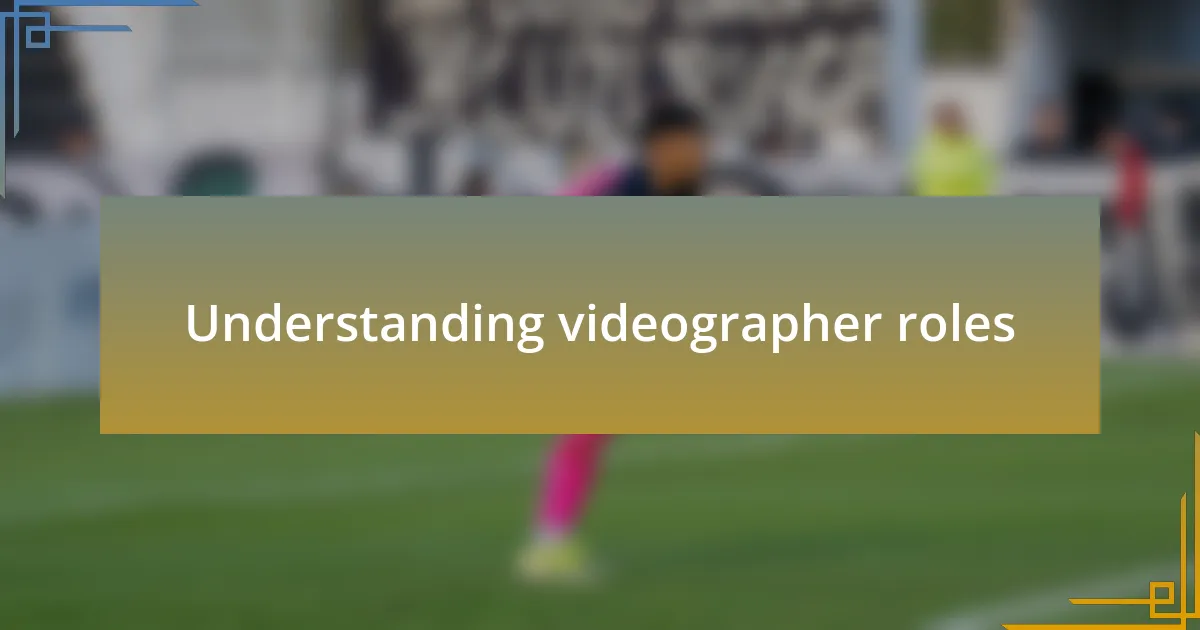
Understanding videographer roles
Understanding the role of a videographer at a wedding goes far beyond capturing the day on camera. From planning the shots to telling a compelling story through visuals, each aspect reflects their artistic vision. I remember one wedding where the videographer integrated meaningful interviews with the couple and their families, transforming simple moments into heartfelt narratives.
Typically, a videographer wears many hats: technical expert, creative director, and even a bit of a psychologist. They need to be attuned to the emotions of the day while also managing their equipment without drawing attention away from the festivities. Can you imagine how challenging it is to know the right moment to step back and capture an honest reaction amidst all the excitement?
Effective communication is another crucial component of a videographer’s role. They often collaborate closely with photographers and wedding planners to ensure a seamless experience. I’ve seen firsthand how a strong relationship between the videographer and the couple can lead to stunning footage, capturing not just the events, but the love and joy that resonated throughout the celebration.
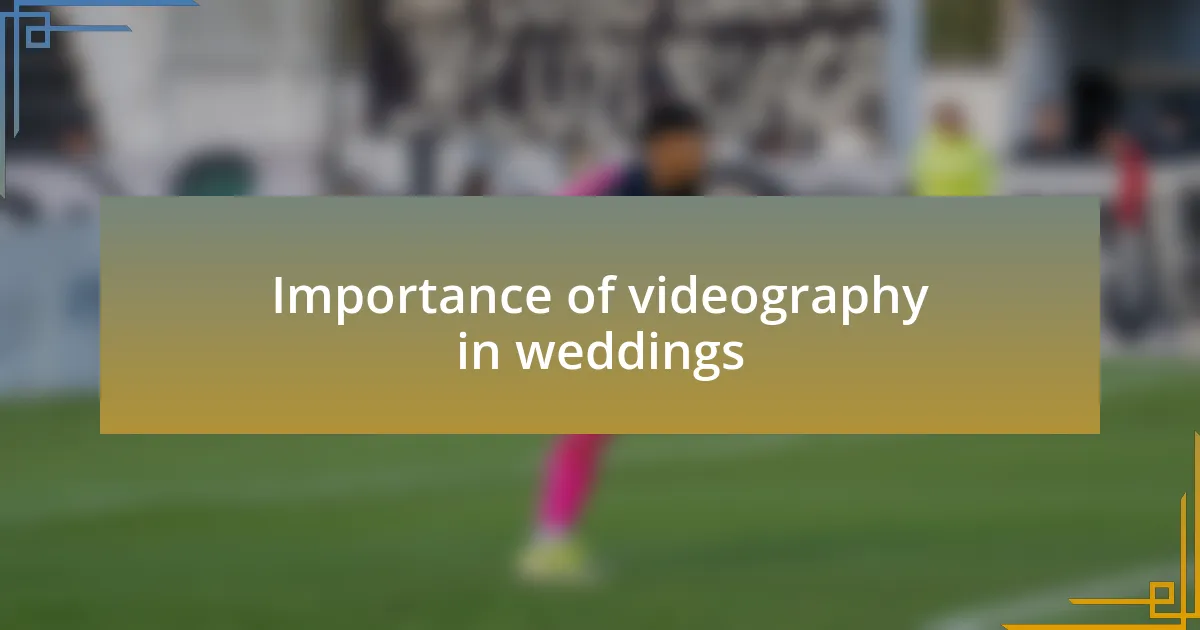
Importance of videography in weddings
Videography plays a significant role in weddings by preserving the moments that often pass by in a blur. I still recall a wedding where the couple had limited time for their photo session, but the videographer captured their genuine laughter and intimate glances, creating a lasting memory even when the day felt chaotic. It’s incredible how those moments, which might go unnoticed, can turn into cherished memories when revisited years later.
Having high-quality video of your wedding allows you to relive those precious moments and share them with future generations. I’ve seen couples watch their wedding video years down the line, often with tears of joy as they relive their vows and the emotions that filled the air. How can one truly quantify the happiness derived from witnessing your loved ones, who may no longer be with you, celebrating your love?
Moreover, videography adds depth to the storytelling of a wedding day. I remember one couple who had their families tell anecdotes during the video – it transformed the footage into a rich tapestry of love and support from those who mattered most. Isn’t it touching to see how love is not just about the couple but also about the people who shaped their journey? That’s the beauty of a well-crafted wedding video.

Key qualities to look for
When interviewing videographers, one of the key qualities to look for is their ability to connect emotionally with couples. I remember a wedding where the videographer took the time to really understand the couple’s story, asking heartfelt questions that revealed their unique journey. This emotional connection translated into a video filled with genuine moments that felt authentic and personal. How can you not cherish a wedding video that resonates on such an emotional level?
Another important quality is a strong portfolio showcasing their diverse work. I’ve come across videographers whose styles vary widely, from cinematic to documentary, but what truly stood out was their ability to adapt to different themes and vibes of each wedding. When reviewing their past projects, I always look for versatility – do they know how to capture both grand celebrations and intimate gatherings equally well? It makes a world of difference.
Lastly, effective communication is crucial. The best videographers I’ve worked with are proactive in sharing ideas and also receptive to feedback. One time, I had a videographer who set up regular check-ins before the wedding day, ensuring that we were aligned on expectations and details. Such open lines of communication help foster trust and comfort, allowing the couple to feel more relaxed on their big day. Isn’t it reassuring to know that someone genuinely cares about creating a video that you’ll treasure forever?
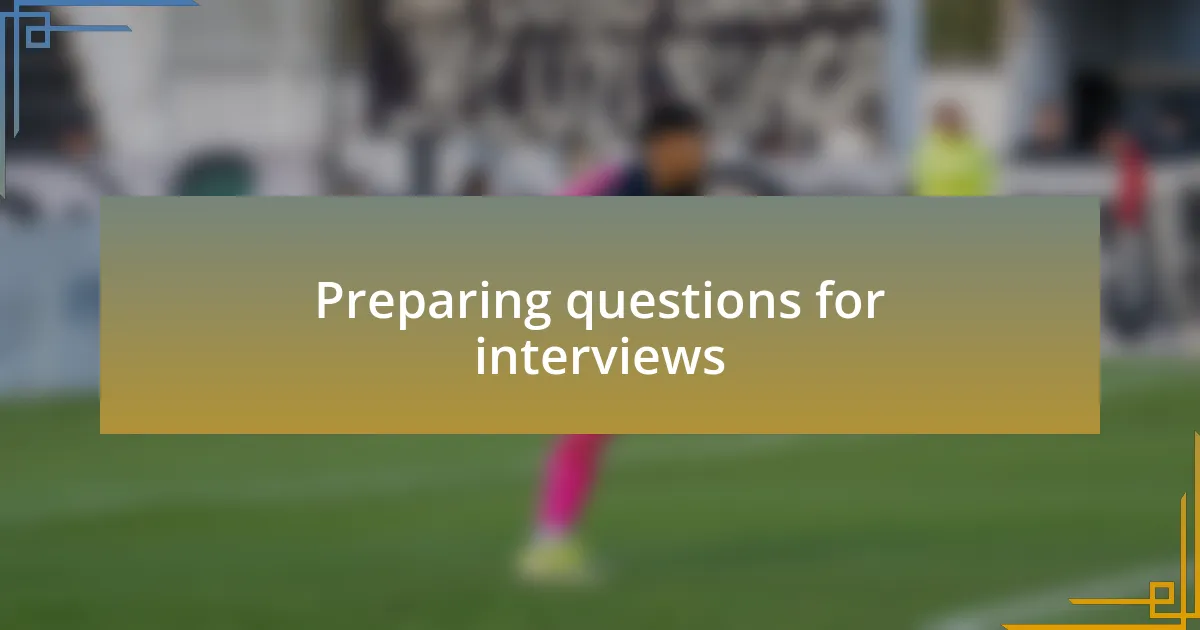
Preparing questions for interviews
When preparing questions for your videographer interviews, I find it essential to think about what truly matters to you as a couple. For instance, I once asked a videographer about their favorite moments from past weddings. Their passionate stories not only showed their experience but also revealed how they cherish the work they do. What aspects of your wedding day do you want the videographer to focus on? Identifying those moments helps shape your questions.
Consider inquiring about their technical expertise and approach to capturing footage. During one interview, I asked a videographer about their preferred equipment and techniques. Their detailed response not only highlighted their professionalism, but it also reassured me that I was working with someone who understood how to create beautiful visuals. Don’t hesitate to dig deeper—how they respond to these technical questions could inform you about their craft and ensure they align with your vision.
Lastly, I recommend asking about their experience with wedding day timelines and flexibility. I once spoke with a videographer who shared how they adapt to spontaneous moments to ensure nothing gets missed. Their willingness to adjust on the fly reassured me that they’d handle any surprises with grace. So, when you prepare your questions, think about how the videographer can harmonize with your unique wedding timeline and what steps they take to ensure everything flows seamlessly.

Evaluating videographer portfolios
Evaluating a videographer’s portfolio is crucial in discerning their style and capabilities. When I first examined a videographer’s work, I focused on the emotional resonance of their footage. A wedding video should not only showcase the day but also evoke feelings; do you feel joy, love, and excitement when watching their samples? For me, that connection was a clear indicator of their ability to tell a story.
As I reviewed various portfolios, I noticed patterns in editing styles and color grading. Some videographers favored a cinematic approach while others leaned towards a documentary style. It was interesting to see how the choice of music and the pacing influenced the overall mood of each video. What vibe speaks to you? I found that identifying these stylistic choices helped significantly in narrowing down my options.
While viewing portfolios, I also paid attention to the variety of wedding settings they captured. I once gravitated towards a videographer who successfully showcased diverse venues—from intimate backyard ceremonies to grand ballrooms. Their versatility made me feel confident they could adapt to my unique vision. Ask yourself, does their work align with your dreams for your wedding day? A well-rounded portfolio often reflects the ability to tailor their approach to different couples and settings, which is invaluable in ensuring your special moments are captured beautifully.
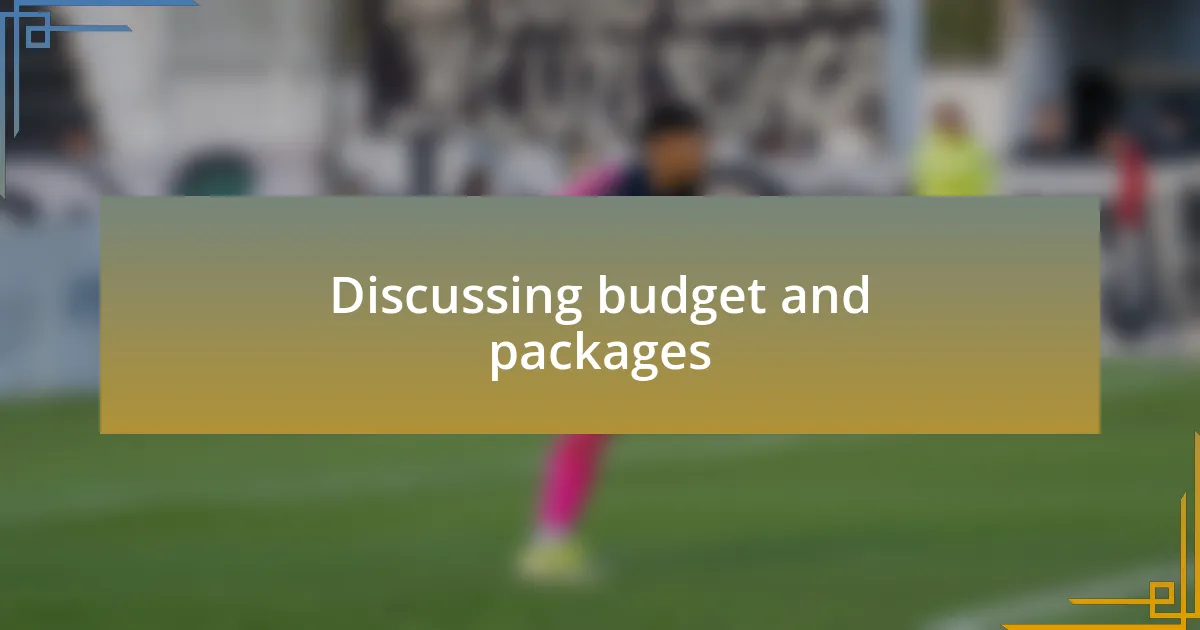
Discussing budget and packages
Discussing budget and packages with a videographer is a vital step that shouldn’t be overlooked. I remember the first time I sat down to talk numbers; it felt daunting, but clarifying my budget upfront helped streamline the process. It’s essential to be honest about what you can afford and ask the videographer what packages they offer that fit within your budget.
Each package may come with different levels of service, such as the number of hours covered, the number of cameras used, and editing options. When I encountered a package that included drone footage, I was immediately intrigued; it was an extra expense, but the thought of capturing our venue from above felt worth it. Have you considered what elements are most important to you? Figuring this out could lead to a more tailored experience.
Don’t hesitate to discuss any additional costs, too, as these can quickly add up. In my experience, I learned that asking about travel fees, editing timelines, and even overtime costs ensured there were no surprises later. Transparent communication about your budget and what each package entails will empower you to make a choice that both excites and fits your financial plan.
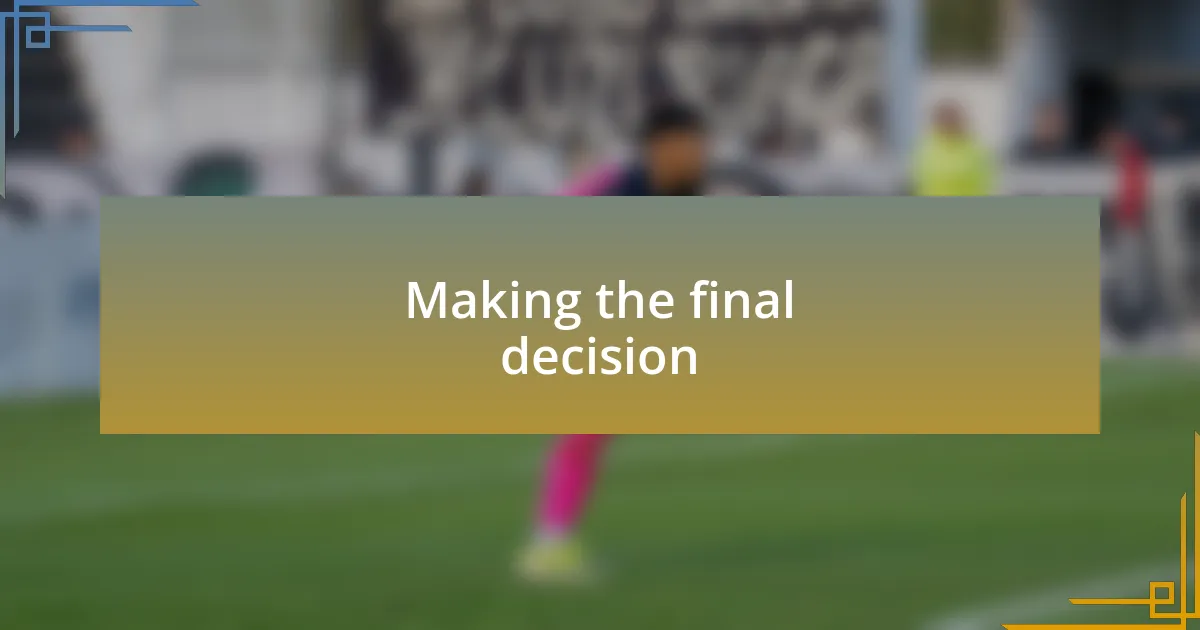
Making the final decision
When it comes time to make the final decision, it’s all about weighing your options carefully. I’ll never forget the moment I narrowed down my choices; it felt both thrilling and nerve-wracking. I remember staring at my shortlist and asking myself, “Which videographer can truly capture our love story?” It’s crucial to trust your gut in these moments.
I found that reviewing the videographers’ portfolios helped me visualize how each one might interpret our day. I vividly recall scrolling through a particularly captivating reel where each frame seemed to resonate with emotion. This helped me realize that the right stylistic match could elevate our wedding videography from just a record of the day to an artistic representation of our journey.
Ultimately, I learned that the right fit goes beyond technical skills and packages. It’s about a connection with the person behind the camera. Do they listen to your vision? I remember feeling a sense of relief when I finally picked the videographer who not only understood my ideas but also shared in my excitement for the day ahead. That personal connection made my decision feel less like a transaction and more like the start of a beautiful partnership.